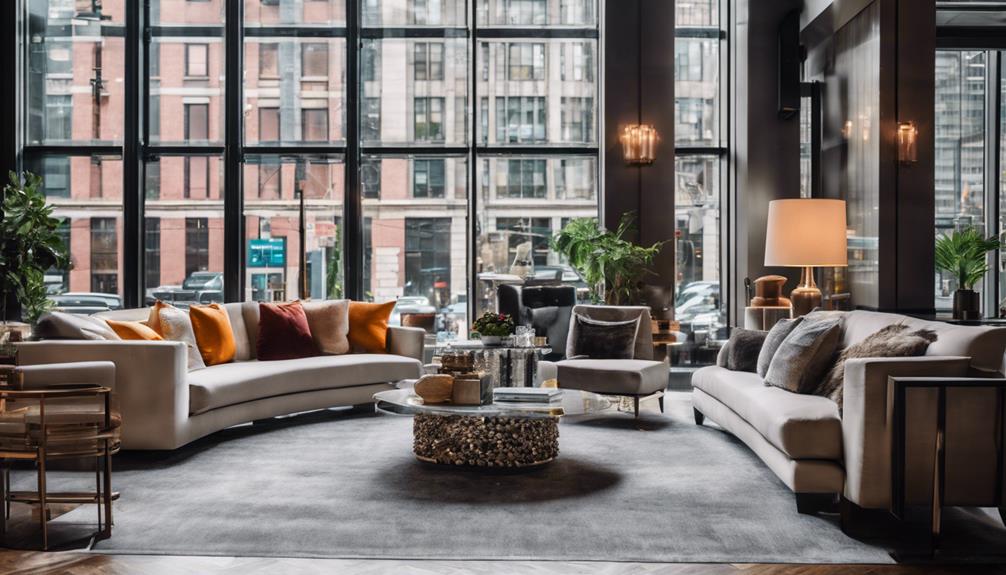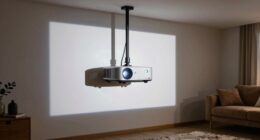When you’re ready to step into your first apartment, the journey can be a mix of excitement and nerves. To set yourself up for success, start by creating a budget that caps your housing expenses at around 30% of your monthly income. Remember to include utilities and other essentials in your calculations. It’s crucial to see potential apartments **in person** to avoid any surprises (photos can be deceiving!). Assess your parking needs and options close by to fit your lifestyle. And when it comes to sealing the deal, don’t be afraid to **negotiate lease terms** for a better deal. These initial steps pave the way for a smooth rental process, with plenty more insights awaiting you. If you’re feeling uncertain or have burning questions about renting furnished places, don’t hesitate to contact the landlord or property manager for clarification. Research the neighborhood thoroughly, considering amenities and safety, and visit at various times to grasp the area’s true vibe. By taking these steps, you’ll boost your chances of finding your ideal starter apartment. So keep exploring, there’s so much more to discover!
Key Takeaways
- Set a realistic rental budget, aiming for housing costs around 30% of your gross monthly income, and include additional expenses.
- Always tour apartments in person to identify potential issues and evaluate the neighborhood and amenities.
- Research and compare renters insurance options to protect your belongings from theft or damage.
- Assess your parking needs based on location and lifestyle, considering available options and associated costs.
Setting Your Rental Budget

When setting your rental budget, aim to keep your housing costs around 30% of your gross monthly income. This guideline helps guarantee you can comfortably afford rent while managing other expenses.
Don't forget to factor in additional costs like utilities, WiFi, and household supplies, which can add up quickly. To accommodate these expenses, you might need to adjust spending in other areas, like dining out or entertainment.
Creating a thorough budget plan is essential; list all potential costs, and prioritize your needs. This way, you'll avoid financial stress and have a clearer picture of your overall financial health.
A well-structured budget not only helps you secure a suitable apartment but also sets you up for long-term success as a renter.
Understanding Insurance Requirements
Understanding your insurance requirements is essential for protecting your belongings and ensuring peace of mind in your new apartment.
Renters insurance is a must-have, as it covers personal items from theft or damage. Think about what you own—electronics, furniture, and clothing—and how much it would cost to replace everything. The peace of mind that comes with knowing you're covered in emergencies is invaluable.
Life insurance might also be worth considering if you have dependents, but it's less critical than renters insurance for your immediate needs.
Evaluate different insurance providers to find the best rates and coverage options. Remember, the long-term benefits of having insurance far outweigh the initial costs, so don't skip this important step.
Importance of Apartment Tours

Scheduling an apartment tour is crucial, as seeing the space in person can reveal hidden issues that photos mightn't show.
During the tour, look for cracks, leaks, or any signs of wear and tear. Pay attention to the overall condition of appliances and fixtures.
You'll also want to get a feel for the neighborhood and nearby amenities. Trust your instincts—if something feels off, it probably is.
If you can't visit in person, request a virtual tour but remain cautious, as virtual views can be misleading.
Ultimately, this firsthand experience helps you make an informed decision and guarantees you're not stuck with surprises after signing the lease.
Don't rush; take your time to find the right place.
Evaluating Parking Needs
Before committing to a new apartment, it is essential to evaluate your parking needs based on the location and your lifestyle. Consider if you'll need a vehicle in a city with robust public transportation. If you do own a car, check if the apartment provides parking and if there are extra costs involved.
Here's a quick comparison of parking options:
| Parking Option | Pros |
|---|---|
| On-Site Parking | Convenience and security |
| Street Parking | Often free, but may be less secure |
| Public Transportation | Cost-effective and eco-friendly |
| Garage Rentals | Safe storage, but typically comes with a fee |
Understanding these options helps you make informed decisions that suit your daily routine and budget.
Negotiating Lease Terms

Negotiating lease terms can save you money and make your living situation more comfortable, so don't hesitate to discuss your needs with the landlord.
Start by doing your research on the local rental market to understand what's reasonable. Here are some key points to evaluate:
- Rent Reduction: If the unit has been vacant for a while, you might negotiate a lower rent.
- Lease Duration: Ask if you can have a shorter lease or a month-to-month option for flexibility.
Conclusion
As you begin this exciting journey into apartment living, remember that preparation is essential.
By setting a solid budget, understanding your insurance needs, and touring potential homes, you're already ahead of the game.
Don't forget to evaluate parking options and negotiate lease terms that work for you.
Think of it like assembling your own Avengers team—each piece plays an important role in creating a comfortable and secure living environment.
You've got this!









